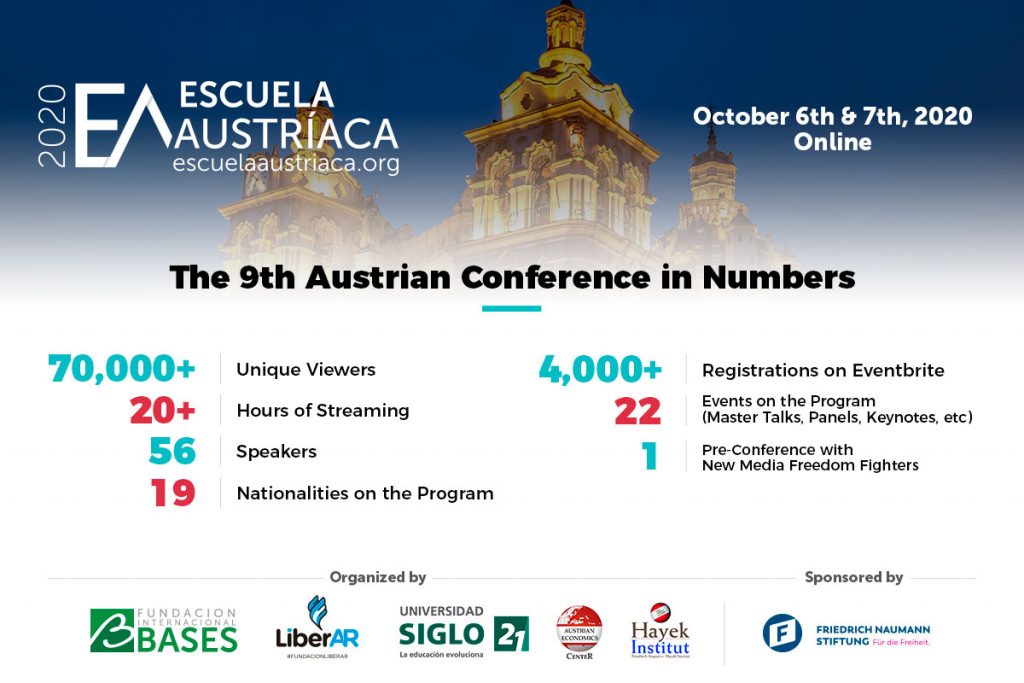(Rosario, October 13th, 2020) – On October 6 and 7, the 9th International Conference “The Austrian School of Economics in the 21st Century” was held. Fully live streamed, the event was co-organized by Fundación Internacional Bases, Universidad Siglo 21, Fundación LiberAr and the Austrian Economics Center as well as once again sponsored by the Naumann Foundation for Freedom.
Throughout two full days, the program presented many of the most prominent figures of the Austrian School of Economics, as well as interesting debates and proposals related to libertarian thought in general.
Thus, as speakers and lecturers, Prince Michael of Liechtenstein stood out, as well as Leszek Balcerowicz, responsible for the reforms that brought Poland out of its socialist economic nightmare and made it one of the most thriving countries in Europe, and Krassen Stanchev, an important figure in the Bulgarian transition to a market economy in the 90s. The keynote speeches given by Adrián Ravier, Nicolás Cachanosky, Alberto Benegas Lynch (Jr), Diego Giacomini, Javier Milei, and Daniel Lacalle were also highlights of the program.
The event that opened the conference stood out in particular, too: the II Juan Carlos Cachanosky Memorial Lecture, which was given by Eduardo Mayora, a Guatemalan scholar and lawyer. In this regard, Federico N. Fernández, President of Fundación Internacional Bases, explained: “The lecture in the memory of Juan Carlos is perhaps the most important event of the conference. We had the opportunity to do it for the first time in 2019, when we exported our congress to the city of Vienna (Austria), and we want it to continue in all future editions of the event.”
The organizers also highlight the impact of the Conference. According to Federico N. Fernández, “the livestream of the event as a whole exceeded 70,000 unique visitors. Other impressive numbers of the congress are that we have 56 exhibitors from 19 different countries, who generated more than 20 hours of content.” Fernández illustrates that only in Eventbrite the conference garnered 4,000 registrations, «which for an online event broadcasted on YouTube denotes great interest.”
Somos Innovación, the Latin American Network that defends human creativity and innovation in the region, also had its space. Firstly, with a lecture by Marian Tupy (United States) about global trends that indicate that humanity is progressing very fast. The lecture was moderated by Roberto Salinas (Mexico), who is the Director of the Atlas Network Center for Latin America. Later, a very international panel with representatives of Somos Innovación from all over Latin America comprised Diego Rojas Llamosas (Fundación Gustavo González, Paraguay), Carlos Augusto Chacón Monsalve (ICP, Colombia), Mariela Palma (Asociación Libre, Costa Rica), Julio Clavijo (CCC, Peru), and Víctor Becerra (México Libertario).
Political discussions also had their space during the conference. On the one hand, Marcelo Duclós led the conversation between María Zaldívar, Antonio Fratamico, Martín Simonetta and Franco López about the tension between populism and freedom in Argentina. On the other hand, Ricardo López Murphy, Ingrid Jetter, Gustavo Lazzari and Agustín Spaccesi answered the poignant questions of Alberto Medina Méndez regarding a classical liberal political praxis.
Ten Austrian Master Talks by Iván Carrino, Carlos Dávila, Iván Cachanosky and Horacio Arana (among others) presented some of the most current points of the debate within the Austrian School of Economics. Writers such as Rogelio López Guillemain and Cristian Moreno presented their works in the panel “On authors and books.” The theme of poverty was addressed by Martín Krause, Eduardo Fernández Luiña and Silvia Alemán. The question about culture in Latin America was discussed by Mamela Fiallo, Vanessa Vallejo and Agustín Laje. Meanwhile, Universidad Siglo 21 had its own panel where Alfredo Baronio, Flavio Buchieri and Ignacio Ruiz’s research on financial inclusion was presented.
The night before the official conference program started, Fundación Internacional Bases and Fundación LiberAr organized a pre-congress as a launching of the event with prominent New Media Freedom Fighters, which they indicate helped attract a lot of interest from young people for the conference.
Finally, regarding the future, Federico N. Fernández commented that “the entire conference will be available online shortly. Moreover, we are already preparing the 10th Austrian Congress, which will be held in the city of Vienna (Austria) in September 2021. We hope in 2022 to be able to physically hold our congress in Córdoba (Argentina) together with the Universidad Siglo 21 and the LiberAr.”
To all those interested in knowing more about the International Congress on the Austrian School, the organizers recommend visiting www.escuelaaustriaca.org




